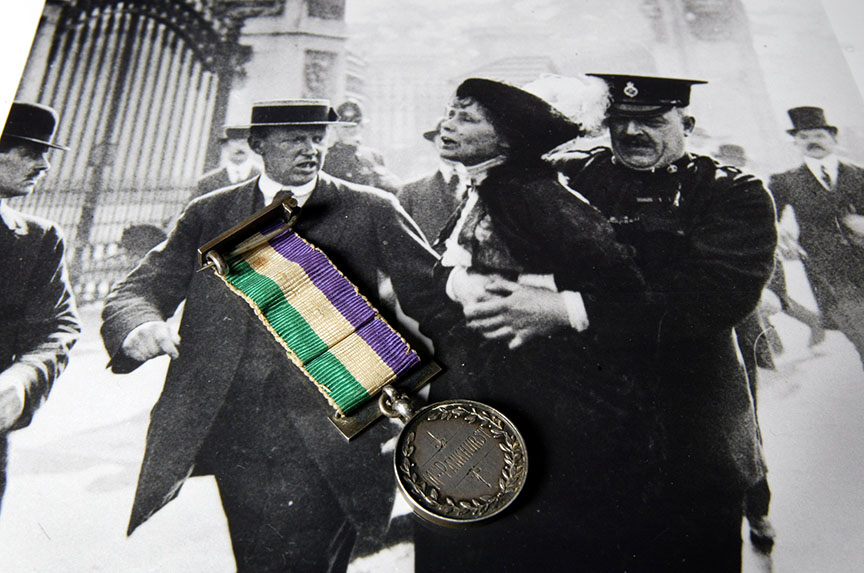 One hundred years ago, Parliament passed the Representation of the People Act, marking a powerful first step towards granting all British women the right to vote.
One hundred years ago, Parliament passed the Representation of the People Act, marking a powerful first step towards granting all British women the right to vote.
The British suffragettes, led by the courageous Emmeline Pankhurst, fought for decades to secure the right to vote. They endured imprisonment and forced feedings. They were separated from their families, and shunned by society. But their determination to bring about change never wavered.
Among their ranks were two young Americans—Alice Paul and Lucy Burns. Inspired by the British movement, they sparked an American revolution of their own, founding the National Woman’s Party and fighting for the Nineteenth Amendment.
These actions of a brave few changed the lives of many for generations to come. It would be another decade before all British women could vote. But a century on, the United Kingdom now has its second female prime minister. How proud that generation of suffragettes would be to see this. Especially as the mother of Prime Minister Theresa May’s godmother was a suffragette herself.
But the prime minister does not stand alone. Following the 2017 general election, we now have the most diverse Parliament in British history: we have 208 women MPs, which is thirty-two percent of the House of Commons; and in local government, women now make up thirty-three percent of elected positions. And there are also more minority and LGBT MPs than ever before.
Here in the United States, women are represented in Congress in their highest numbers in history, and a record number of women are running for seats in upcoming elections—from the local city council to the US Senate.
But we still have a long way to go. One hundred years ago, women’s path to the voting booth was unblocked, but significant barriers to success remain. Worldwide, women comprise only twenty-three percent of parliamentarians. Only 6.4 percent of chief executive officers at Fortune 500 companies are women. And the #MeToo movement has started a long-overdue conversation about the acts of discrimination, harassment, and violence that many women are subjected to every day in the workplace.
We must build a culture of respect and equality at the centre of our public life. It is not just the right thing to do, it’s the smart thing to do—for a more educated, healthier, prosperous, and peaceful society. No country can flourish if half its population is left behind.
That’s why the British government is making gender equality, empowerment, and inclusion among its top priorities. We are creating a $1.4 million fund to encourage women to enter politics. We have committed to legislation to prevent violence and abuse, as well as resources to support victims. And in a powerful show of symbolism, we are commissioning statues of female leaders like Millicent Fawcett and Emmeline Pankhurst.
This isn’t just a domestic issue. Over the last two years, we have invested almost $5 million in women’s rights projects in at least twenty-eight countries—supporting millions of girls in school, saving thousands of women’s lives during pregnancy and childbirth, and providing food security to millions more. Because there are more than 130 million girls out of school worldwide, we have made girl’s education a central pillar of our foreign, development, and defence policy. And we are a global leader in preventing sexual violence in conflict, having committed over $100 million to the training of over 17,000 military and police and the overseeing of eight-five deployments of experts.
There is more to be done. The conversations dominating newsfeeds and headlines have shown that now, more than ever, we all have a part to play in the fight for gender equality.
We must ensure that the legacy of these brave women lives on—not only in statues, but in statutes. For centuries, the United States and the United Kingdom have worked side by side as leaders in human rights. So, let us take Mrs. Pankhurst’s motto to heart, “deeds, not words.”
Sir Kim Darroch is the British ambassador to the United States. Follow him on Twitter @KimDarroch.
Image: Emmeline Pankhurst's "Imprisonment Medal" is seen on a photograph in Central London that shows Pankhurst being arrested outside Buckingham Palace. The medal was awarded to Pankhurst, leader of the suffragettes, by the Women's Social and Political Union in 1908 after she was arrested, tried, and jailed for producing leaflets calling for the general public to "rush the House of Commons." (Reuters/Paul Hackett)
